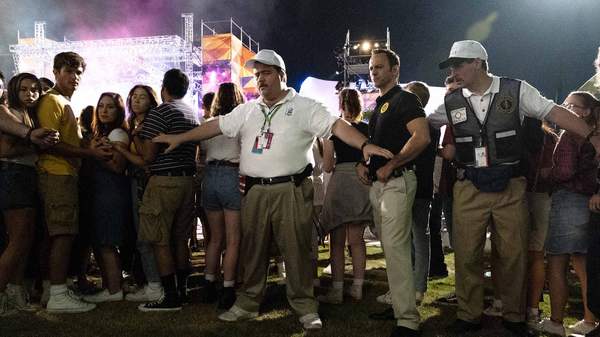Overview
UPDATE, December 16, 2020: Richard Jewell is available to stream via Netflix, Binge, Foxtel Now, Google Play, YouTube Movies, iTunes and Amazon Video.
All it took was a concert and a backpack for Richard Jewell's (Paul Walter Hauser) life to change forever. It's the summer of 1996, and the aspiring cop is thrilled to be working as a security guard at a gig during the Atlanta Summer Olympic Games. But as songs like the Staple Singers' 'I'll Take You There' fill the city's Centennial Park, Jewell spots an unattended bag under a bench. He swiftly informs the police on duty, who figure he's overreacting but evacuate the area anyway. As the crowd begins to disperse, the bomb explodes. While one person is killed, another suffers a fatal heart attack and 111 others are wounded, the toll would've been much higher if Jewell hadn't sounded the alarm.
That's the real-life story that monopolised news headlines 24 years ago. It's also the tale that Jewell, with his desperate desire to work in law enforcement, was overjoyed to have attached to his name. And, it's the narrative that Richard Jewell tells, although Clint Eastwood's involvement should make it obvious that it doesn't end there. As demonstrated with gusto in the latter years of his five-decade directorial career, Eastwood is drawn to heroes. He's not just fascinated by people acting bravely, but by true tales of fortitude in the face of pressure, scrutiny, admonishment and even contempt by society, authorities and bureaucracy. American Sniper's flag-waving tribute to the deadliest marksman in US military history, Sully's recreation of the Miracle on the Hudson and subsequent investigation, and The Mule's account of an octogenarian forced to become a drug courier to make ends meet — they all fit the profile, as does Jewell's swift slide from saviour to suspect.
Played with equal parts zealousness, assertiveness, awkwardness and friendliness by I, Tonya and BlacKkKlansman's Hauser, Jewell fit the FBI's profile, too. With no other real leads to chase, agent Tom Shaw (Jon Hamm) becomes certain that the security guard's demeanour, portly physique and obsession with cops makes him the culprit. That Jewell lives with his mother (Oscar-nominee Kathy Bates) doesn't help. Nor does the arsenal of guns in his bedroom ("it's Georgia," Jewell notes). So when Shaw slips his theory to The Atlanta Journal-Constitution reporter Kathy Scruggs (Olivia Wilde) — a woman happy to trade sex for tips and just as dubious in her ethics in general, the movie intimates, a perspective that's been refuted by those who knew her — Jewell's transformation from hero to accused perpetrator becomes official.
With Jewell, his devoted mum and no-nonsense attorney Watson Bryant (Sam Rockwell) on one side and Shaw, Scruggs and the institutions they represent on the other, Richard Jewell becomes an us-versus-them battle — between an ordinary guy vilified instead of celebrated for doing an extraordinary thing, and the forces conspiring against him. With his threshold for subtlety waning over his past few films, Eastwood's feature is that blunt, as is the worldview that comes with it. His conservative politics are well-known, so lambasting the over-reaching government and decrying fake news should come as no surprise. Still, the lack of nuance with which Eastwood tells this tale — working with a script by Billy Ray (The Hunger Games, Captain Phillips and Gemini Man), and adapting a 1997 Vanity Fair article by Marie Brenner — casts a shadow over the movie.
Jewell went through something that no one should have to endure. Eastwood doesn't downplay that ordeal, including the fact that Jewell's status as a suspect was widely publicised — even though he was never charged — but the clearing of his name wasn't. And yet, when it comes to portraying the FBI and media, Eastwood does exactly what they both did to his protagonist. Law enforcement and the press are treated so simplistically in Richard Jewell, especially Scruggs, that Eastwood slants the film in one direction and doesn't care to look elsewhere. You could read the filmmaker's version of Scruggs as another of his celebrated working-class characters doing whatever it takes to get by. Wilde's brash, committed portrayal of the now-deceased journalist certainly aims for that interpretation. But there's just not enough depth, balance and empathy on Eastwood's part to support it. Scruggs is a clear villain here — so much so that Eric Rudolph, the actual perpetrator of the attack, barely rates a mention.
If Richard Jewell proved bombastic across the board, then its treatment of Scruggs mightn't stand out as much as it does. But Eastwood takes great care to show the complexity of Jewell's situation, laying out the details in a manner befitting any weighty police procedural or 'wrong man' thriller. His staging of the bombing is as tense, gripping and superbly crafted as anything in his 38 films behind the lens — and he smartly anchors the movie around Hauser's multifaceted performance as a man teeming with contrasts. What lingers, though, is the glaring contradiction at the heart of the feature. Richard Jewell advocates against one-note judgements while flaunting its own. It champions the truth about someone unfairly pilloried by the media, yet spins its own questionable story about a real-life figure. Yes, this is a film about a hero, but it didn't need to be a movie about a cartoonish villain as well.
Features
Information
When
Thursday, February 13, 2020 - Thursday, March 5, 2020
Thursday, February 13 - Thursday, March 5, 2020
Where
Various cinemas in MelbournePrice
$15–25-
Event Type
